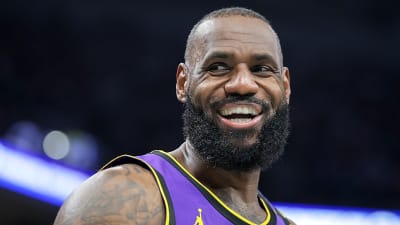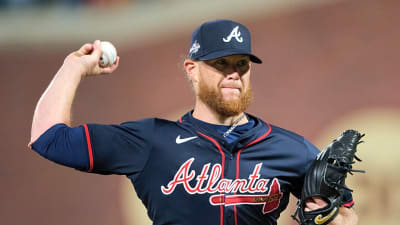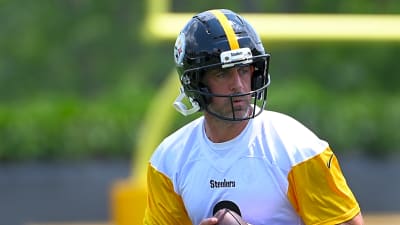
Bryce Huff is gone. It may not be franchise-altering, but it is worth a historical dive.
The San Francisco 49ers have acquired edge rusher Bryce Huff for a conditional fifth-round pick— the official conclusion of an invisible chapter in Philly. Huff was initially thought to be a proxy for Pro Bowler Haason Reddick, as the pass rushers more or less swapped places last offseason. After an unremarkable first season of a three-year, $51 million agreement that included just 12 playoff snaps, the Eagles have chosen to diverge.
This summer, Philadelphia is a city elevated from the harsh realities and analyses of the NFL. But even if only for a moment, arguably the biggest chip on Howie Roseman’s mural warrants a reflection before being painted over.
Bryce Huff’s Philly Tenure Ended in Failure
Huff’s regression was an institutional failure and a misfire of epic proportions.
Bryce Huff's pass rush win rate at edge and pass rush get off by season.
Obviously an awful season in Philly and these numbers declined there, too. But I think still plenty of room for optimism he can make a real impact as a situational pass rusher for 49ers. pic.twitter.com/mM1cksZBWj
— Seth Walder (@SethWalder) June 3, 2025
For Roseman, for Vic Fangio, and for an organization that has spliced the importance of acquisition and development in conjunction. While his late-season struggles can be attributed to a wrist injury, Huff was a non-factor on the majority of his reps in 2024. His ineptitude against the run forced Fangio to use him as a standup rusher, an alteration from the “hand in the dirt” stance that brought him 10 sacks in 2023.
That flew in Robert Saleh’s 4-3, a scheme he will rejoin in San Francisco. To be a down lineman in the Fangio 3-4, stopping the run is a baseline skill (hence Brandon Graham’s impact from a four-point stance). So, the forever question in Philadelphia: why did they think this would work?
Not for nothing, the Eagles recouped some cap relief and reeled in their 13th pick in the 2026 NFL Draft. They made it work. Without breakouts from Nolan Smith and Jalyx Hunt, the Huff experiment would likely loiter into the fall.
To expedite all retrospect, Huff’s Philly tenure did not and does not matter. His archetype was incongruous with his expectations. Yet, he will head west with a ring and a chance at revival. Roseman parts ways, knowing his recent draft picks and low-risk signings will formulate another exceptional front seven.
And they won— exoneration for everyone.
Still, regardless of a successful season for the Birds, Huff’s dismissal solidifies him as one of the worst free-agent signings in Eagles history. Real money and deep organizational expectations paired with zero (maybe negative) value will often put one’s name on a list. A championship softens the blow, but Bryce Huff has arrived at the Eagles’ Hall of Infamy.
Huff’s trade proposes a question that has not been pondered in quite some time. The day Chip Kelly was relieved of his duties, Howie Roseman never looked back. This is easily the worst move in the modern era of the Philadelphia front office, but no close second is a compliment. There is a lesson to be learned, though, as his other disastrous signing has a similar skeleton.
Bryce Huff's former teammate Brandon Graham explained why Huff struggled with the Eagles:
"With the Jets, it was just that defense, man. I know what it's like playing in that 4-3, wide-nine, go get it. Every play, it's always stop the run on the way to the quarterback. That's… pic.twitter.com/4UUHbs1NXY
— Coach Yac
(@Coach_Yac) June 1, 2025
Roseman’s Other Mistake: Nnamdi Asomugha
Ah, yes, the 2011 “Dream Team,” as dubbed by Vince Young. While many of the signings that offseason (including Young) failed to create a winning environment in Philadelphia, none make an Eagles fan wince quite like Nnamdi Asomugha. A reigning All-Pro, the former Raider inked a five-year deal worth $60 million, a top-end contract for a cornerback with $25 million in guarantees.
It went sideways. Asomugha, known for his man-to-man excellence, was unable to adjust to a scheme consisting mostly of zone drops. That, compounded with an aging body, made him unplayable under his deal by the end of 2012. With little willingness to restructure his contract, Asomugha was out the door that offseason and was retired by the end of 2013, just three years after he signed in Philly at the peak of his career.
Two playoff-absent seasons with Asomugha make it impossible to draw positives, a contrast to Huff in that regard. But Roseman relapsed into recidivism with his newest free agent mistake. Much like in 2011, he made a large commitment to a talented player without a clear fit. Then again, with the signings 13 years apart, archival practices are required to criticize Philadelphia’s General Manager in free agency. Could be worse.
Chip Kelly’s Playground: DeMarco Murray & Byron Maxwell
Could be much worse. Roseman has two bad eggs in over a decade of work as the Eagles’ head honcho. When Chip Kelly took over as the team’s GM in 2015, it took him merely months to make a pair of the worst signings in franchise history. Oh yeah, and he traded away the face of the franchise.
When LeSean McCoy was inexplicably dealt to the Bills in early March that year, Kelly knew the team had to find a replacement in the run game (rather than… just keeping McCoy). After Frank Gore backed out of an agreement with Philly, the Eagles zeroed in on rushing champion DeMarco Murray. Following a strong run in Dallas, Murray was willing to jump ship and continue the run of success for the rushing attack in Philadelphia, while reuniting with college QB Sam Bradford (another bad pickup, for the record).
On the heels of a year where he captured over 1,800 yards running between the tackles, Murray predictably did not work out under Kelly’s juvenile shotgun offense. With a mediocre offensive line and playbook, he was unable to get downhill on run plays, often being dropped behind the line of scrimmage while moving laterally. Kelly was canned before the end of the season, and Murray carved out a solid couple of years in Tennessee after a trade.
Impressively, Murray is only the runner-up to the biggest free-agent disaster that offseason. Sandwiched between the McCoy and Murray moves, the Eagles thought they found a long-term answer on the defensive boundary. Hailing from the “Legion of Boom” in Seattle, Byron Maxwell earned a payday in Philadelphia. A starting corner in that year’s Super Bowl, the Eagles forked over $63 million to Maxwell in a six-year deal. He made it through one.
Schematics cannot be faulted for Maxwell’s disappointment. Perhaps more vulnerable without the safety help of Kam Chancellor and Earl Thomas, the success never translated to Philly. The faltering began in Week 1 at the hands of Julio Jones but sustained through 2015. Maxwell was ranked 54th of 81 qualified cornerbacks that season by PFF metrics. He was in Miami the following year, as Roseman continued to erase every move made by Kelly as GM.
Nine years removed, and the ship has been set straight.
Bryce Huff was Bad, But the Eagles are Good
After nearly a decade of surgically maneuvering the free-agent pool, the Eagles have another mistake to learn from. Similar to previous busts on the market, Bryce Huff was unable to find a concrete role in the scheme. Chances are, he is a much-improved pass rusher in San Francisco under his former head coach. Fortunately, Howie Roseman’s success with the draft and other signings has neutralized the repercussions of failure.
Sometimes, big swings have to be taken. With the uncertain futures of Haason Reddick, Josh Sweat, and Brandon Graham (all three are now gone), Philadelphia felt like swinging on Huff. Once thought to have every-down potential, that no longer seems realistic. The development of young talent has acted as a safety blanket, ensuring the Eagles retain success off the edge.
Small signings of Josh Uche and Azeez Ojulari recycle the depth, with the opportunity for more.
In 2011 and 2015, the Birds floundered, and hindsight was the only perspective. With Philadelphia at the apex, Huff’s deal will be remembered in passing. He is one of the biggest individual mistakes in the franchise’s history.
The good news? Nobody cares.
More must-reads:
- Details emerge about Nick Chubb's contract with Texans
- Five potential landing spots for Pro Bowl CB Jaire Alexander
- The 'MLB Comeback Player of the Year award winners' quiz
Breaking News
Trending News
Customize Your Newsletter
 +
+
Get the latest news and rumors, customized to your favorite sports and teams. Emailed daily. Always free!







